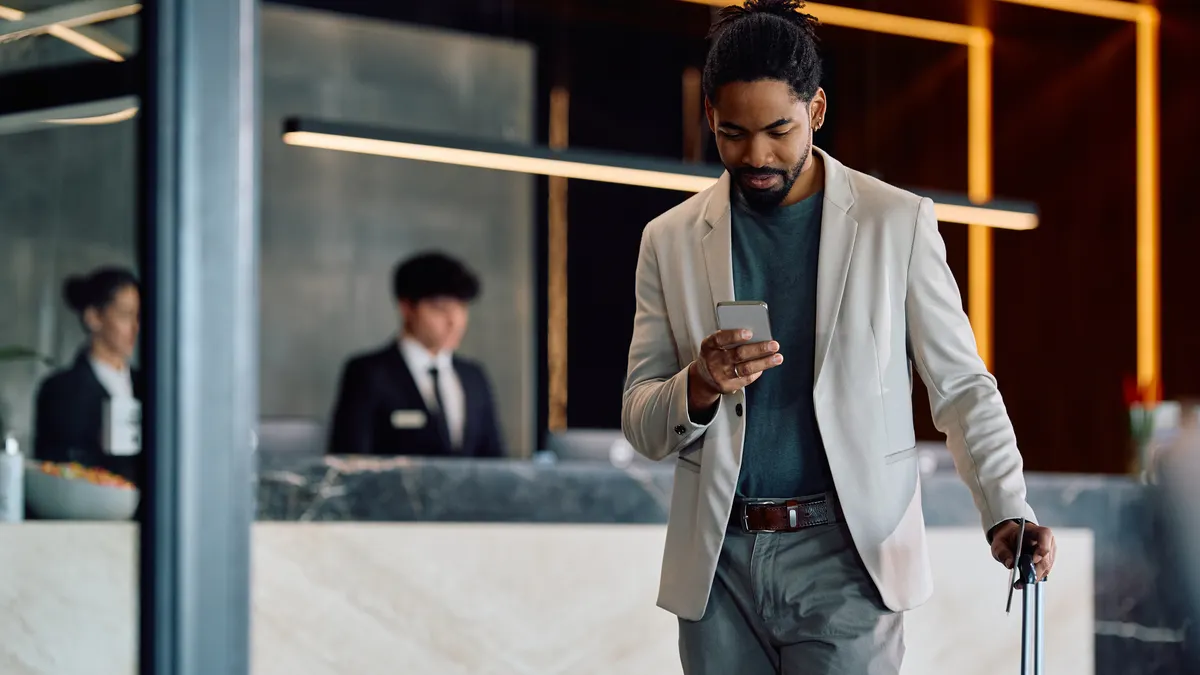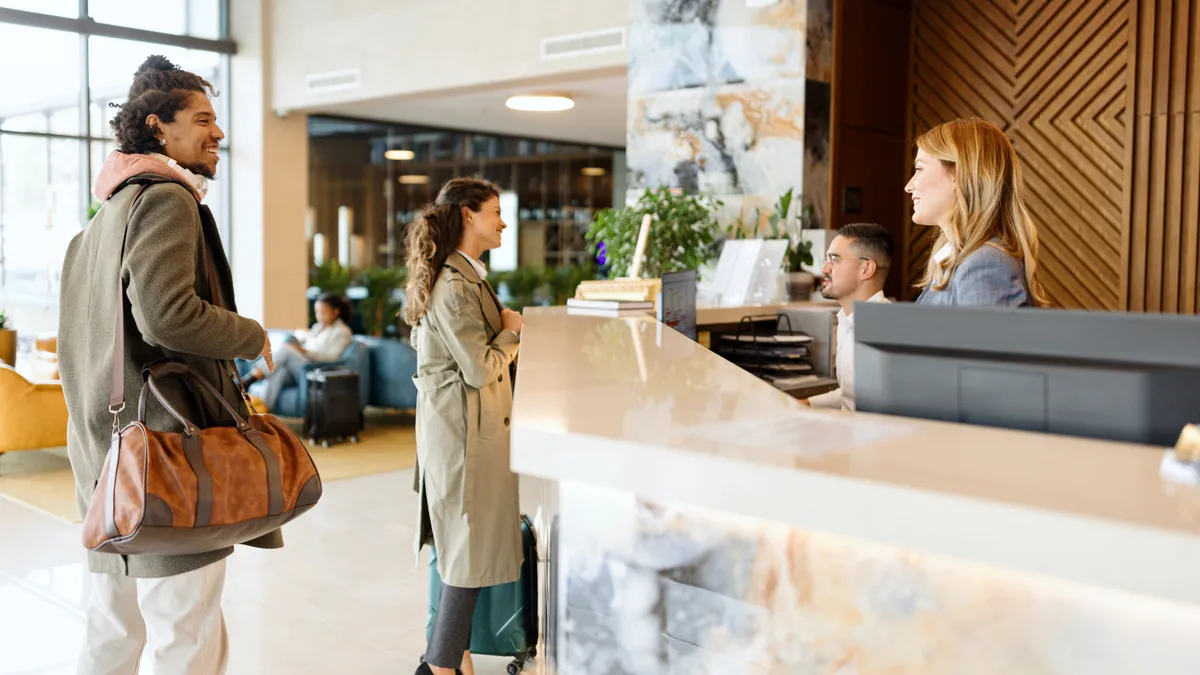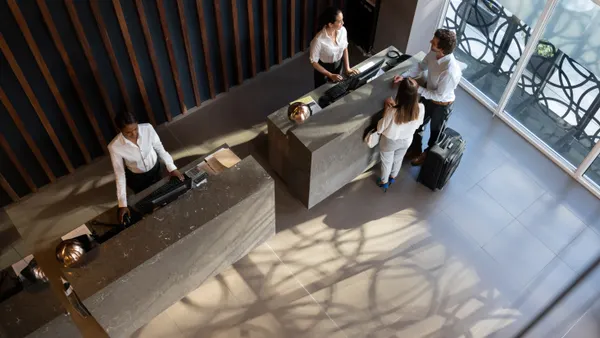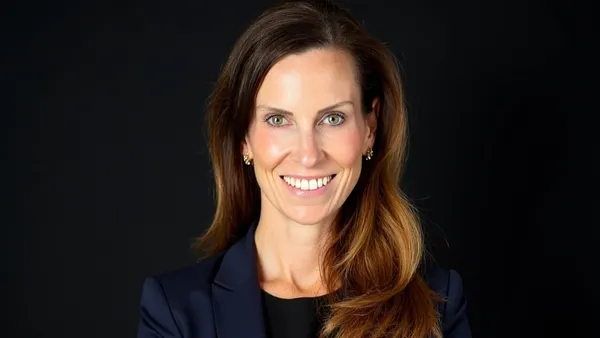Jasmine pulls into the hotel parking lot after a long day of travel, her phone buzzing with a notification that her room is ready and waiting. It’s a corner room away from the elevator, just as she prefers. She bypasses the front desk and heads straight to the elevator and to her room where her smartphone unlocks her door with a simple tap. Inside, a voice assistant greets her by name, adjusts the temperature to 68 degrees and suggests a nearby restaurant that matches her preferences—all based on her past stays and current location.
While artificial intelligence may feel like the antithesis of hospitality, it’s quickly becoming a guest preference: According to Hotel Tech Report’s “State of Hotel Guest Technology Report 2025,” nearly 58% of guests feel AI improves their hotel booking and stay, and 65% of travelers say they want the technology used by their hotel to be more advanced than the tech in their homes.
These expectations come at a critical moment for the hotel industry. Despite the uncertain economy, travelers are not cancelling plans but are adjusting budgets.: The 2025 “Deloitte Summer Travel Survey” finds that more than half of respondents are traveling this summer and planning to stay in paid lodging, up 5 points from 2024. Business travel is also robust, with more than half of respondents to an April 2025 Global Business Travel Association (GBTA) survey aiming to capture current sentiment indicating their companies’ travel spend will remain stable or even increase.
Due to economic headwinds creating unpredictability, hotels must be at the top of their game to capture discretionary dollars. Here are four ways hotels can help provide frictionless, personalized encounters guests crave.
Four Game-Changing Technologies Hotels Should “Check Out”
Across multiple guest touchpoints, these technologies are reshaping how successful hotels compete.
Tech Use Case 1: Contactless check-in/checkout
Hotels that have installed this upgrade report it is quite popular, according to Hospitality Tech’s “2024 Customer Engagement Technology Study: Unlocking Loyalty” report. Sixty-four percent of respondents want to check in using their mobile devices, while more than half of respondents express satisfaction with check-in/check-out kiosks at hotels, and 53% prioritize hotels that offer contactless payment options.
Property Spotlight: Large brands, including Hilton, Hyatt and Marriott, offer mobile check-in and keyless entry through their apps. Perks include the ability to check in early and requesting a special room location.
Tech Use Case 2: Chatbot concierge
These AI-driven companions are increasingly handling routine questions that once took away from front desk staff time. Standard queries include pool hours and restaurant recommendations. These assistants can instantly pull up requested information and free staff to provide more guest-focused service.
Many travelers today are used to turning to a chatbot to quickly seek answers to routine queries without waiting in line or on hold: One survey found that half of respondents would be interested in staying at a hotel with this service. And as hotels continue to grapple with staff shortages—according to the American Hotel & Lodging Association (AHLA)’s “2025 State of the Industry Report,” employment levels remain below 2018 and 2019 —chatbots allow team members to prioritize meaningful interactions and provide useful information to guests.
Property Spotlight: While many major brands offer chatbots, some hotels are employing next-gen technology. The Beverly Wilshire, a Four Seasons Hotel in California, uses a holographic concierge in the presidential and penthouse suites .
[H3] Tech Use Case 3: Personalized offers
Precision hospitality means tailoring offers to individual guests based on their preferences and past experiences. The right discount on a premium item — from a personalized service like a spa visit to discounted dessert — can encourage guests to spend more than they planned, adding revenue to the hotel and building customer loyalty.
According to the AHLA’s “2025 State of the Industry Report,” 82% of travelers appreciate “surprise suggestions.” As Deloitte noted in its 2025 Travel Trend survey, “Timely and targeted deals and offers can help reach travelers at the right moment and attract any incremental dollars they may be willing to spend. And delivering memorable experiences with minimal fuss can help keep travel high on the list of priorities in the year ahead.”
Property Spotlight: Accor provides personalized offers through its ALL.com app based on previous bookings to provide curated hyper-local content that introduces guests to restaurants, events and attractions aligning with their interests. The technology demonstrates knowledge of a guest’s preferences without taking away the customer’s power to choose.
Tech Use Case 4: Smart room technology
Smart room technology personalizes services and remembers preferences, including lighting and temperature settings to pillow firmness, from previous visits within the hotel company’s portfolio of properties. Beyond guest comfort, these systems optimize energy efficiency by intelligently managing lighting and HVAC systems based on occupancy and usage patterns.
The ability to select specific guestroom attributes is important to 73% of respondents according to Hospitality Tech’s survey, and 68% value the ability to control the guestroom environment, including temperature and lighting, via a mobile app.
Property Spotlight: Marriott, the world’s largest hotel brand, has deployed voice-activated systems in properties so that guests can control room features.
Technology as a Tool, Not a Replacement
Of course, technology can never replace the essence of hospitality. In fact, the “State of Hotel Guest Technology Report 2025” found that while 70% of guests find chatbots helpful for simple inquiries, they still prefer human interaction for complex requests.
Hospitality will always require a human touch, but the right technology enriches the experience for travelers, who will enjoy their stay more through the various recommendations and suggestions AI tools can provide. That enhanced experience will then build customer loyalty not just at a specific hotel, but for a hotel brand’s entire portfolio of properties.









